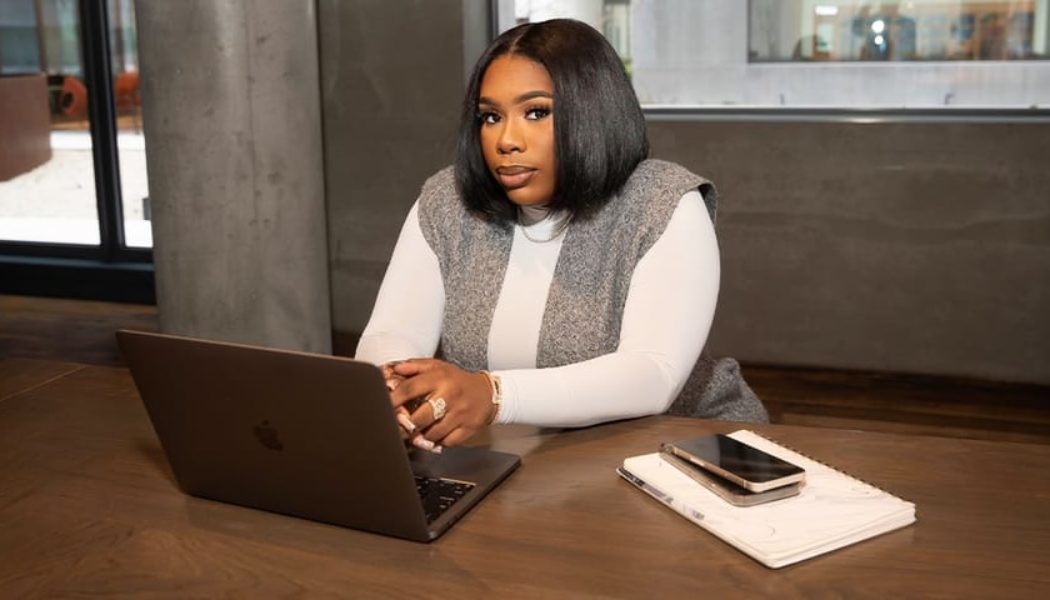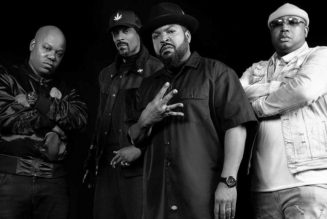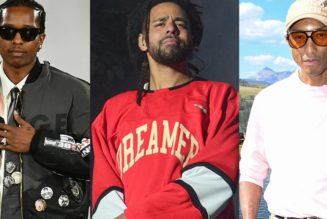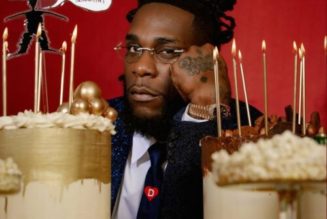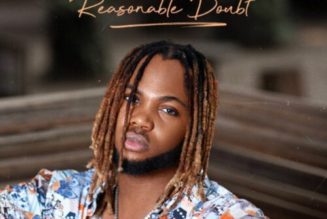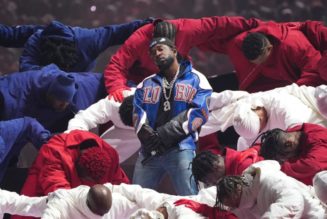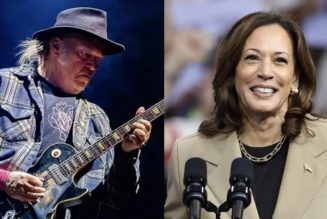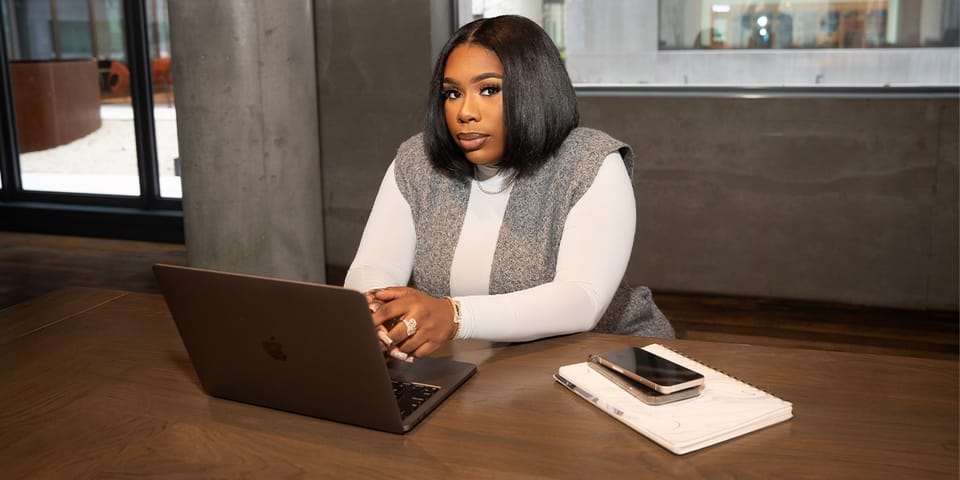
All three of Janelle Gibbs’ phones never stop ringing. Ever. As the new Senior Director of Publicity at 300 Entertainment and 360 Tailored, Inc.’s CEO, it comes as no surprise that there’s always a text message, email or phone call waiting for her response., “The scope of my job is simple: I connect music and people,” she says.
The publicity veteran has always put a great emphasis on storytelling, which allows her artists like G Herbo (who she worked with during her almost-five-year stint at Epic Records) and Rick Ross to successfully share their message without sacrificing their individuality. “As an artist, it’s not only about what you say but also how you say it, so I bridge the gap by being a voice to the masses to help tell the story,” she explains. Gibbs fondly refers to Herbo’s PTSD album cycle as one of the highlights of her time at Epic, and says it serves as a stellar example of how her care for her artists goes beyond the space of music. Her team and the Chicago rapper broke barriers during the release of PTSD: they were battling the height of the pandemic and the overall mental health struggles many were facing, yet the album become Herbo’s highest debut (at the time) and paved the way for his Swerving Through Stress initiative, which provided free therapy to those in inner city communities. “It was more than music; it was the overall impact,” she says. “We started a conversation around mental health in rap, normalizing therapy and seeking help.” To top it off, Herbo landed on the Forbes 30 Under 30 list.
As a child growing up in a house that was always filled with music and with a father who played old reggae records, Gibbs always knew she wanted to work in music. Her advisor at LIU Post, where she graduated with a BFA in Public Relations/Image Management, took the time to sit down with her and really explore what she liked about music, eventually leading her to where she is now. “Fused together, my childhood and college experiences catapulted me into the rewarding career I have now,” she shares. “School didn’t inspire my path. It prepared me for a path I already knew I wanted.”
“It’s the ‘firsts’ that are an unmatched feeling — the first show, first interview, first placement. The energy is different. You feel every win, big or small.”
In three words, how would you describe your job to someone who isn’t familiar with the music industry?
Narrator. Visionary. Realist.
What are you most excited about in this next chapter for you at 300 Entertainment?
300 is a label that focuses more on the artistry and less on the numbers, so I’m most excited about working with artists in their early stages — artists that get signed based on pure artistry and great music. Artists like WanMor, who just performed at the GRAMMYs with Stevie Wonder. and Hunxho who has this poetic flow — it just hits different when you are a part of the foundation of breaking an artist.
What does a typical day look like for you in your work life?
My day is as dynamic as my artists. One thing that’s for certain though is that it always starts with a cup of coffee! A typical day includes ideating, strategizing and analyzing not only the short story but the long lead ones for the artists on our roster. It always begins with what’s happening on social media, listening to music that re-inspires me and brainstorming on ideas for my artist. A typical day can also be flying across the country for a five-hour photoshoot and flying back the same night to show up for another artist press day. No day is typical, but it’s worth every minute.
“Do your research — not only of the business itself, but also those that sit in the seat. Know who is in the room before you enter. Seize the opportunity to intern.”
You’ve worked with Rick Ross for quite some time. How did that come about?
I started as an intern at Epic, where we met during the roll out of his album Rather You Than Me. Fast forward, I eventually worked my way up and transitioned as the lead publicist assigned to him during the Port of Miami 2 album roll out, then led his PR campaign for his latest album, Richer Than I Ever Been. As I transitioned out of Epic, we decided we worked well together, so we continued to do so in an independent space where I started my company, 360 Tailored. With Ross, it’s more than music PR. It’s everything that has to do with him from business to brands etc. We still hustlin’, no ceilings! Just dreaming out loud and having our way.
Over the years, you’ve worked extensively with a number of artists across a variety of genres. Is there a major change in your approach to each artist because of their sound?
There is no major change in my approach, because my approach is based on the individual person. I take the time to curate tailored strategies that separate my artists not by genre, but by story. While there are publications that cater to certain genres, there are also spaces where genre doesn’t matter.
You work with both established and rising artists. Do you find any big differences and similarities in how they execute their campaigns?
The similarity is the need for consistency. For rising artists, it’s about dropping continuously and giving a product everybody can touch. Artists need to be on the ground and trained to go. Visibility is key. Take my artist Dub Aura as an example — for him, it’s about shows, interviews, brand partnerships and ways to keep his face and music out there. On the contrary, for an already established artist, there is no need to oversaturate. Instead, the attention is on the impact: continuing to push the envelope in an authentic way and elevate the brand while being intentional.
“Anything your name is attached to is a representation of you, so always go hard!”
What’s been the best part about working very closely with several independent artists?
Their hustle and hunger. It really reminds me of why I got into the music business. Life’s most persistent question is “What are you doing for others?” Well changing just one person’s life is good enough for me. It’s the “firsts” that are an unmatched feeling — the first show, first interview, first placement. The energy is different. You feel every win, big or small.
What are the necessary first steps someone should take to enter a career in music in publicity and communication?
Do your research — not only of the business itself, but also those that sit in the seat. Know who is in the room before you enter. Seize the opportunity to intern. Personally, interning played a really big role in my career and is a great way to get your foot in the door. Most importantly, build relationships and get to know people. Check in, meet up and support wholeheartedly. If you can’t connect with the people around you, how are you going to be a liaison to your artist to connect to the masses?
What lessons and/or work ethics did you only pick up after working in the music industry?
Anticipate what is needed before it is asked. Anything your name is attached to is a representation of you, so always go hard!
What was the biggest challenge you’ve had to face so far, and how did you overcome it?
Balance between my professional and personal life. This is not a 9-to-5 type of job, it’s more like a 24/7 thing. I have to make sacrifices on where I show up. Life is short and balance is essential. I’ve learned that we can’t take for granted that there will always be time to spend with family, friends and loved ones later. Do it today.
What is one thing about your job that most people would find unexpected or surprising?
Outside of being a publicist, I’m an acting therapist, stylist, security guard, manager and more to my artist.
“Allow space to grow and collaborate, but always remember who you are and what you stand for.”
Is there a secret to career longevity in this industry?
Stay authentic to your true self. Say what you mean and mean what you say. Allow space to grow and collaborate, but always remember who you are and what you stand for. Never fold on your morals! Most importantly, find your village within the industry. I’m grateful for people like Ericka Coulter and Ebonie Ward, who are my village. With them, it’s deeper than rap, period!
What are some habits you follow regularly to always maintain a good headspace for work?
Prioritize. Everything is not on fire. I evaluate what needs my attention now, and what can wait. Even on my worst day, I’m grateful. I also have an amazing support system of family and friends that I can always lean on to decompress and re-energize.
What does a day off look like for you?
I’m still learning what a day off is, but a “day off” for me is living in the moment. Although that may mean me taking work calls from the spa, it allows me to disconnect in a way that works for me. I’m still working on fully disconnecting.
If not music, what would you be doing?
I would probably be a radio personality; I’ve been told I have a pretty cool speaking voice.
Stay tuned for more features with music industry professionals — from managers to sound engineers, stagehands and others; the people who make the music world go round without standing behind a microphone.
